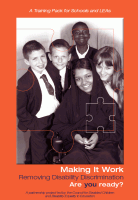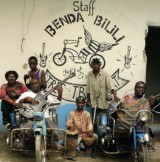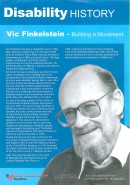UK
- General Inclusive Education
- Disability Equality
- Early Years
- Schools
- Post-school
- Curriculum
- Disability and the Media
International
General Inclusive Education
 Altogether Better
Altogether Better
Published in association with Comic Relief. A comprehensive resources pack covering the issues surrounding Inclusive Education – aimed at teachers, school governors and others. 56 pages. download pdf
Altogether Better video – download by chapter.
Preview download
1. The Full Story download
2. The History download
3. Trying to Change download
4. Media Portrayal download
5. Daily Discrimination download
6. Civil Rights download
7. Inclusion in Schools download
8. What does it Take? download
9. Break down the Wall download
Inclusive Education: A Human Right
Richard has contributed two chapters to the 3rd edition of ‘Education, Equality and Human Rights’ (ed. Mike Cole). They can be accessed below:
(Chapter 7) The Struggle for Disability Equality
(Chapter 8) Inclusive Education: A Human Right

Disability Equality in the Classroom – A Human Rights Issue.
Richard’s groundbreaking book, commissioned in 1990 by ILEA.
In Defence of Inclusion
“Warnock challenges the rights of disabled children to inclusion.” In 2005 DEE placed an open letter, signed by over 600 people and organisations, as an advert in the TES issue 8th July 2005. download
Disability Equality
Developing Disability Equality in the UK
25th June 2009 NNATPIP Conference in Birmingham. Richard gave a keynote to the National Network for Advisory Teachers for Physically Impaired Pupils. Richard’s presentation is available for download.
30th June 2009 Nottinghamshire SENCO Conference. Richard gave a keynote at the Conference and ran two workshops. Richard’s presentation is available for download.
July 2009 Tower Hamlets consultancy. In July Richard undertook a consultancy for Tower Hamlets on their schools Disability Equality Schemes. Out of 98 schools and nursery schools 70 schemes were evaluated and a report prepared for schools and the Council. Each school had its scheme evaluated and comments made on how to improve it. This followed two training sessions one for primary and one for secondary schools. In addition Richard visited 12 schools for half a day at their request to help develop their disability equality schemes. Richard’s presentation is available for download.
Disability Equality in Education
“After 17 Years” – the history of the charity Disability Equality in Education. download
Two further essays on the history of the charity:
DEE in 2006. DEE by Anna Sullivan.
Disablist Bullying
New document – 2016
Challenging Disablist Bullying in Schools
Disablism in Class – ABA has worked in partnership with World of Inclusion to create six short films to support schools to challenge disablist bullying.
See the films here
Challenging bullying and harassment of disabled people in class: a resource for teachers (PDF)
Young disabled People and bullying at school. Powerpoint presentation. (15MB) download
Tackling disablist language based bullying A teachers guide produced for the Anti Bullying Alliance
Tackling disablist language based bullying in school – FINAL (1)
Ten Tips for Tackling Disablist Language Based Bullying
10 Tips on Tackling disablist language based bullying in school – FINAL NOV14
A History of bullying and harassment of disabled people
Challenging-Bullying-and-harassment-of-disabled-people-FINAL
http://www.anti-bullyingalliance.org.uk/media/10881/Challenging-Bullying-and-harassment-of-disabled-people-FINAL.pdf
Duty to Promote Disability Equality
Two training courses aimed at educating teachers and staff on the implications of the Disability Discrimination Act (2005).
Version for Primary schools pdf version MS Word (35MB)
Version for Secondary schools pdf version MS Word (30MB)
Early Years

All Equal, All Different
All Equal, All Different is a resource pack to develop an understanding of disability and promote inclusion in the Early Years and Key Stage 1. Flyer The pack received a favourable review in The Guardian 27th April 2004, and was also reviewed in The Teacher magazine published January/February 2005.
Pack Contents
Six Illustrated Story Books written by disabled people.
The Pillars of Space download
Love to Learn Elliott’s Story. download
Moya and the Elephant Dance download mp3
My Dad Uses His Wheelchair download
Scarlet’s Big Adventure download
Zahrah and ‘The Place’ download
Alphabet Book (with finger spelling and Braille letters). download
Counting Book with BSL and the Braille System. pdf cover pdf cover MS Word contents (10.7MB MS Word)
Disabled People who made a difference! Forty Five A4 Posters of historical and current disabled people whose lives have made a difference to the world and to society. download pdf text only pictures
Sixteen A3 Posters of Disabled Children in a classroom setting. download captions only
A Guide for Practitioners and Teachers cover contents text only

Early Years
Inclusion in Early Years coursebook pdf version MS Word (17MB)
Powerpoint slides (18MB)
Everybody In – Developing Inclusion in Early Years and Key Stage One. pdf version MS Word
Schools
Challenging disablist bullying in schools
A workshop series developed for the Anti-Bullying Alliance.
Films of the workshops below.
Full workshop resources available here.
Reasonable Adjustments Project
The Reasonable Adjustments Project was filmed in 2004 up and down the UK and was published in 2006 by the Department of Education and Skills.
The charity, Disability Equality in Education was commissioned by the DfES in April 2003 to produce a training manual, with linked index DVDs to show how to make Reasonable Adjustments. The pack was released in April 2006, for use by schools and professionals associated with schools.
A link to all the clips with youtube links can be found below –
>> RAP document with youtube links <<
Are We Nearly There Yet?
The results of a survey carried out by a 16 year-old wheelchair-using school student of 100 wheelchair-using students in 2001, revealing a shocking lack of access and disability equality.
- 35% of pupils wanted to go to a local school but found it inaccessible
- Journey times too long, 75% of those using special transport find it late every day
- Special transport is not flexible for after school activities
- 70% missed part of each class because of difficulties getting round the school
- 80% of pupils that can’t stand miss school trips because of lack of planning
- Wheelchair users who can’t walk never go on trips abroad
- Poor provision in school hinders independence
- Safety is emphasised over independence
- Little inclusion in PE and Sports
- Sex education is taught insensitively to disabled students
- There are almost no role models
- Teaching Assistants often take on the role of teachers though not qualified
- Staff at all levels need more training about disability and inclusion
Summary Checklist for Action. pages 1 & 4 pages 2 & 3
Full Report is available from Eleni Burgess for £4 including postage.
e-mail eleni.burgess@googlemail.com
Everybody Welcome Here
Everybody is Welcome Here Secondary Disability Equality in Practice. A poster campaign for secondary schools. Flyer Download Posters 1 Download Posters 2

Free Up Your Life
A project to explore how disabled young people feel about themselves and how they should make sense of living their lives as disabled people.
Final Report front cover back cover text only version
Outdoor trips and activities
Disabled Pupils/Students and Outside Activities by Richard Rieser. A detailed coverage of the impact of the Disability Discrimination Act on Schools, Colleges and Universities. download
Also see Off The Premises Handbook published by Optimus 3rd August 2009, Editor Caroline Stagg Amazon link

School Inclusion
Inclusion in Schools course book MS Word text only
Disabled Pupils/Students and Outside Activities by Richard Rieser. A detailed coverage of the impact of the Disability Discrimination Act on Schools, Colleges and Universities. download
Handout Cambridge Partners in Policymaking download
Inclusion Education and Human Rights download
Social Emotional and Behavioural Difficulties (SEBD) – Applying the Social Model of Behaviour download
Impact of the Duty to Promote Disability Equality (2008)
The Impact of the Duty to Promote Disability Equality in Schools in England: A Report for the Department for Children, Schools and Families (DCSF). DEE were awarded a tender by DCSF in July 2008 to carry out a number of tasks, this is the report on four of these:
- To fulfil the research function by organising and delivering workshops for children and young people in July 2008. The purpose of these events would be to identify the positive differences that the disability equality duty has made, and barriers and gaps that remain to be overcome, plus ideas on how gaps might be filled and barriers reduced. The events will also refresh our understanding of the priorities for change of disabled children and young people
- Techniques to be developed to be inclusive of all access needs and ensure that non-verbal children participate fully.
- The findings of these workshops to be collated and presented in a report identifying key priorities and evidence of success and barriers to be included in the Secretary of State’s Report
- Desk research to identify strong examples of Disability/Single Equality Schemes from schools and guidance/schemes from local authorities.
Download report 10MB MS Word.
Scores school DES. download.
An evaluation of school Disability Equality Schemes (DES) in a London Borough. download.
Making it Work
 Making it Work (2002) – Removing Disability Discrimination. Making it Work is a pack of materials to support:
Making it Work (2002) – Removing Disability Discrimination. Making it Work is a pack of materials to support:
- training on the schools’ duties in the Disability Discrimination Act; and
- implementation of the duties.
Whilst the main focus of the pack is on the disability discrimination duties, one of the key purposes of the pack is to bring these duties together with the other two main sets of duties that govern the way that schools and LEAs provide for disabled pupils, namely the SEN duties and the planning duties. These duties are set within the framework of wider government guidance and the broader context of developing inclusive schooling. pdf Guide text only Powerpoint presentation notes slides text
Post-school
Further and Adult Education
 Disability Audit for a Community Learning and Skills Service. download
Disability Audit for a Community Learning and Skills Service. download
Post Schools : Further Education and Adult Education. download
Higher Education
Higher Education disability equality training – generic course book. pdf version MS Word (25 MB)
Curriculum
Disability Rights Commission
Citizenship and Disability: A classroom resource pack for teachers – Key stages 3 and 4.
Video “Talk” 13 mins. download (44MB)
Resource pack book. download pdf (38MB)
QCA Disability in Curriculum Project
On 2nd October 2009 a successful Steering Group meeting was held in London. The PowerPoint presentation is available in pdf format. download
Disability in the Curriculum : An annotated resource list printed and web based
Resources (1)
This disability equality material is designed to help primary and secondary teachers to embed teaching and learning about disability equality positively in their practice and planning of the curriculum.
The material was developed by World of Inclusion with the support and sponsorship of the Qualification & Curriculum Development Agency. The views expressed here do not necessarily reflect the position of the QCDA.
It is highly recommended that teachers using the material here read this article Understanding the Social Model of Disabilityand what it means when raising disability in the School Curriculum.
Below you can download some of the materials that have been developed with schools working on the project.
Resources for raising disability in the curriculum, written and web based download
QCDA Disability and Curiculum film clips Nine films of schools working on the project – www.redweather.co.uk/disabilityinthecurriculum
 General Resources
General Resources
Disabled People who have made a Difference. download
Impairment, Barriers and Solutions. download
Language and Terminology. download
Making Sense of Disability. download
When part of your body does not work KS2. download
KS2 Disability Equality Starter Lesson. download
The Wall – A short video made with Comic Relief (33MB). download
Understanding Disability – The Social Model of Disability and Human Rights. download
Ways of Promoting Positive Attitudes Toward Disabled People For Pupils. download
Disability Myths and Legends. – This PowerPoint presentation examines the ancient Greek myths of Hephaestus, Medieval myths of Changelings and modern African myths of Albinos. preview pdf Powerpoint (33MB)
Primary Ks2 Yr 5/6 Disability Equality lesson – Here is a sample lesson to round up the unit on Myths and Legends with Year 5/6. Developed by Linton Williams, St Matthias Primary download
Poems that were written by Class 5/6 St Matthias, Hackney after work on Myths and Legends. download

Secondary English
Poems with a disability focus. download
English Work in KS3 and KS4. download
Examples in the news. download
Hacked Off – A Journalist’s guide to disability. download
Stereotypes – Defying stereotypes: the way forward. download
What is in the Headlines? download
A case of human rights by Simon Brisenden. download
Richard III and the portrayal of disability. download
Private Peaceful by Michael Morpurgo – Disability Aspects. download
Uppity Downs A Poem by Michelene Mason celebrating World Downs Day
Poems by Disabled People for UKDHM 2016 Poems by Maresa MacKeith,Quiet Riot & Micheline Mason Poems Booklet 2016
Secondary Maths
Maths Activities on Disability and Employment in the United Kingdom. download
Disability and employment statistics. download
Factsheet – Employment. download
Disability and employment statistics definitions. download
Data and Information on Disability and Employment in United Kingdom. download
Mathematical basis of the Braille Code. (The following lesson was developed by Maths Department at Anthony Gell Secondary, Derbyshire.) lesson plan templates codes
 Secondary History
Secondary History
Federico da Montefeltro. download
First World War and Disability. download
The Letter to a Teacher. download
Law for the Protection of Hereditary Health – Germany 1933. download
Nazi euthanasia order 1st September 1939. download
The French Revolution. download
Schooling for disabled pupils 1900-1950. download
History – First World War. (The attached powerpoint and lesson plan and materials were developed for Year 8 at Anthony Gell School, Derbyshire by Sarah Tomlinson and David Everett.) powerpoint lesson plan worksheets Medicine at War
Secondary Science
The Human Body and its Impairments. download
Common impairments and their causes. download
Common Impairments Visible and Invisible. (Developed by Chris Carr of Anthony Gell Secondary School, for Year 8 Science.) Powerpoint lesson plan worksheets
Geography
Disability in the USA – Census 2000. download
 Music
Music
Ludwig van Bethoven. download
Porgy and Bess. download
Johnny Crescendo and Direct Action Network. download Listen to 2 of Johnny’s songs track 2 track 3
Staff Benda Bilili. download
Science and History
Background on Eugenics. download
Ovitz family. download
Lest we Forget. download This shows how the Nazis applied the ideas of the Eugenics movement to exterminate up to 1 million disabled people as a precursor of the Holocaust.
 Art
Art
Breughel painter of the people 1521-1569. download
Frida Kahlo. download
Art KS2/KS3 2 sessions examining different disabled artists life and works. download
Modern Languages
The French Revolution. download
Sport and PE.
The Paralympics. download
Citizenship.
Developing Inclusive Education. download
Schooling for disabled pupils 1900-1950. download
Alison Lapper – Statue in Trafalgar Square. worksheet cuttings headlines quotes
 Citizenship and Secondary History.
Citizenship and Secondary History.
These six posters were produced by the Birmingham Disability History Project and focus on six leading members of the British Disability Movement and their role in bringing about rights for disabled people.
Ian Stanton – Natural Born Rebel. download
Paul Hunt – Institutions are not solutions. download
We are not Objects of Pity – Block Telethon. download
Vic Finklestein – Building A Movement. download
DAN – To Boldly Go Where Everyone Else Has Gone Before. download
Not Dead Yet – Jane Campbell. download
Dave Lupton Cartoons – writing as Crippen.
Crippen asks Bob Williams-Findlay to share his experiences with the Spastics Society. download
Equality issues don’t fit in silos. download
Crippen looks at Neurodiversity. download
Citizenship and Personal Social Education.
Johnny Crescendo and Direct Action Network. download
Work in Primary Schools (14 Schools)
Click on the School name below to download a pack with write-up, pictures and supporting materials.
Batheaston Primary
Brighton and Hove Primary
Davigdor Infants
Essex Primary School
Fairway Primary Birmingham
Halley Primary
Hawksworth Wood Primary, Leeds
Hillside Primary Kirklees
Mill Lane Primary, Stockton-on-Tees film
Orion Primary Barnet
St Matthias Primary Hackney film
St Patricks Primary Lewisham
St Peters Primary Wapping film
Yarm Primary Stockton-on-Tees film
Work in Secondary Schools (8 Schools)
Anthony Gell Secondary, Derbyshire film
Ashcroft Academy Wandsworth
Bethnal Green Technology College film
City of York Consortium
Clapton Girls Technology College
Ellen Wilkinson Girls Ealing
South Camden Community film
Whitton Secondary Richmomd
Work in Special Schools (3 Schools)
Ashfield Special School
Cherry Tree Special
Grove Park Special, Brent

Real People Real Lives
Real People Real Lives is a resource pack developed to challenge the misconceptions held about disabled people and to promote inclusion in Key Stage 2 and 3 as part of the Personal, Health and Social Education Curriculum. The pack could also be used in any settings that involve young people or training for diversity. flyer guide pdf guide .doc cards posters

SCOPE – Speaking for Ourselves
Speaking for Ourselves may prove to be one of the most important projects Scope has ever undertaken in its half a century of existence. First, because as the project’s title implies, it will enable the many voices of the people Scope empowers to be heard better more clearly, more effectively and more passionately by a wider audience than ever before. This is important, particularly to those at school still learning about society and life and their role in it, because the history of disabled people is a vital part of the history of us all.
Scope Speaking for Ourselves Guide download
Scope Speaking for Ourselves Timeline download
Disability and the Media
Disabling Imagery
A joint project betwen DEE and the British Film Institute. Provides a wealth of information on how disability has been represented in moving image from the earliest days.  The approach is from a disability equality and human rights perspective, which draws on the collective thinking of the Disabled People’s Movement. The project website is no longer available however a scanned version of the final project can be found below:
The approach is from a disability equality and human rights perspective, which draws on the collective thinking of the Disabled People’s Movement. The project website is no longer available however a scanned version of the final project can be found below:
Source materials available for download are –
Teaching Guide Cover Text
Website source text pictures
Disability in the Media leaflet.
The 1 in 8 Campaign
The 1 in 8 Campaign produced a short leaflet about the representation of disability in the mainstream media. It provides useful tips towards producing material that doesn’t patronise, undermine or insult disabled characters/people.
It can be accessed here:

Invisible Children
The Report of the Joint Conference On Children, Images and Disability. Organised and published by Save The Children and The Integration Alliance. preview (pdf) full report(pdf 28MB)
Save the Children welcomed the chance to work with the Integration Alliance to organise the Invisible Children Conference. We believe that all disabled people have a right to full and equal participation in social, economic, educational, cultural and political spheres of life. For the children and families with whom we work this means working to remove barriers which prevent the integration of disabled children into local services and enabling families to exercise choices in all aspects of their lives. Save the Children believes that the negative way disabled people are often portrayed in images available to children and young people re-inforces discrimination and contributes to the barriers which exclude disabled people and deny choice.
Global – UNCRPD, UNICEF and UNESCO, Commonwealth
Implementing Inclusive Education
– A Commonwealth Guide to Implementing Article 24 of the UN Convention on the Rights of People with Disabilities (2012 version) PDF version
Inclusive Education FINAL word text
– A Commonwealth Guide to Implementing Article 24 of the UN Convention on the Rights of People with Disabilities (2008 version) pdf version MS Word
also available online at https://read.oecd-ilibrary.org/commonwealth/education/implementing-inclusive-education_9781848591271-en
It’s About Ability
– An explanation of the Convention on the Rights of Persons with Disabilities. pdf version text only version
Presentation to the Commonwealth Heads of Government.
New York August 2006 – Leonard Cheshire
Leonard Cheshire International present Disability Equality Training and Inclusive Education UN New York Tuesday 22nd August 2006 download

UN Convention on the Rights of People with Disabilities
The UN Convention on the Rights of People with Disabilities: An opportunity to develop inclusion and disability rights around the world. download
It’s About Ability
– An explanation of the Convention on the Rights of Persons with Disabilities. pdf version text only version
Resources and interventions in different regions

International Presentations and Training
General
European Equal Employment Project – A Human Rights Approach to Developing Disability Equality. pdf version Powerpoint version (62MB)
Developing Inclusive Education in Southern Africa.
Powerpoint Slides Workbook DVD Cover
India North South Dialogue Dehli 2005.
Inclusion, Empowerment and the Vital Role of Disabled People and Their Thinking download
Slide presentation pdf version Powerpoint version (26MB)
Argentina – October 2005
In October 2005 Richard accompanied by Tara Flood went to Argentina at the invitation of the British Council at the British Embassy in Argentina. Two presentations were made to large groups of teachers (200 & 300) and resources were shared including the Index for Inclusion. Spanish and Portuguese versions attached.
Index for Inclusion (Castellano). download
Indice de Inclusion Carpeta verde. download
A number of meetings were held with Buenos Aires and La Plata Regional Education Ministries and the National Ministry of Education. We held a meeting with disabled people and addressed a breakfast seminar of influential people, and attended a reception and launch of a book on disability rights by Par Foundation.
The Challenge of Developing Inclusive Education preview pdf (4MB) Powerpoint (48MB)
The Challenge of Developing Inclusive Education (Spanish) preview pdf (4MB) Powerpoint (46MB)
Russia – April 2008
Partnerships: A Journey Toward Inclusion – Moscow, Arkhangelsk, Ukhta, St. Petersburg, Tomsk 23rd April 2008. download
Riyadh, Saudi Arabia March 2009.
Richard was invited to give a keynote presentation to 3rd International Conference on Disability and Rehabilitation. The Conference theme was Scientific Research in the Field of Disability. 4000 people attended over the 4 days, many of them disabled people. Richards presentation was entitled Giving a Voice to the excluded: lessons from developing inclusive education. Download in pdf format Powerpoint format (17MB)
Dakar Senegal ANCEFA 2nd General Assembly 6th to 8th April 2009.
Richard was invited to attend and contribute on developing inclusive education. ANCEFA is the African Network Campaigning on Education for All. It comprises national councils of teachers and civil society organisations in 32 Sub-Saharan countries. With 40 million children not attending primary education ion Sub-Saharan Africa and around 40% of these are disabled there is a pressing need to include the inclusion of disabled children in the campaign. Richard presented and raised the profile of the UN Convention on the Rights of People with Disabilities and submitted comments on their action plan. Richard’s presentation is available for download.
Dubai, United Arab Emirates, 26th -30th April 2009.
Richard was invited by the Victor Peneda Foundation to take part in leading training for Principals, teachers and supervisors from 10 primary schools. These will form a pilot scheme for inclusive schools from 2009. Richard’s presentation is available for download.
St. Petersburg, Russia 18th to 21st May 2009.
Richard led a four day seminar on developing inclusive Education with participants from 5 Russian Cities:- St Petersburg, Moscow, Arkhangelsk, Ukhta, Tomsk. This was the third seminar led by Richard under this collaboration with Perspektiva funded by the European Union. A follow up of visits to each City and one day seminars and meetings with officials will take place in Autumn/Winter 2009/2010.
Richard’s presentation is available for download in both English and Russian
Also available for download are –
- the seminar workbooks (in Russian) Workbook 1 Workbook 2 Workbook 3
- “Effective Inclusion Education” English Russian
- “Essential Viewing RAP Early Years” English Russian
- “Essential Viewing” Russian
- “Index of Inclusive Education” English Russian
- “Learning Styles – Dyslexia” English Russian
- “Campaigning for Human Rights – Lessons from History” English
Paris, France 11th June 2009.
Richard delivered a keynote address to the French National Council on Disability- Conseil Français des Personnes Handicapées Pour les Questions Européennes (CFHE). Richard concentrated on explaining the struggle for disability rights in the UK and the legislation that has resulted. Richard’s presentation is available for download in both English and French
Note that each file is approx 53Mbytes in size and will take a long time to download!
Germany – June 2010
On 21st and 22nd June 2010 Richard was invited to take part in a Conference in Germany of the 16 federal state ministers of education and culture examining the educational and legal aspects of implementing the UN Convention on the rights of people with disabilities. The German Education system is highly stratified with a large number of children attending special education. Children aged three to six may attend kindergarten. After that school is compulsory for nine or ten years. From grades 1 through 4 children attend elementary school (Grundschule), where the subjects taught are the same for all. Then, after the 4th grade, they are separated according to their academic ability and the wishes of their families, and attend one of three different kinds of schools: Hauptschule, Realschule or Gymnasium.
The Hauptschule (grades 5-9 in most German states) teaches the same subjects as the Realschule and Gymnasium, but at a slower pace and with some vocational-oriented courses. It leads to part-time enrolment in a vocational school combined with apprenticeship training until the age of 18.
The Realschule (grades 5-10 in most states) leads to part-time vocational schools and higher vocational schools. It is now possible for students with high academic achievement at the Realschule to switch to a Gymnasium on graduation.
The Gymnasium (grades 5-13 in most states) leads to a diploma called the Abitur and prepares students for university study or for a dual academic and vocational credential. The most common education tracks offered by the standard Gymnasium are classical language, modern language, and mathematics-natural science.
Grundschule teachers recommend their students to a particular school based on such things as academic achievement, self confidence and ability to work independently. However, in most states, parents have the final say as to which school their child attends following the fourth grade. About one third go to each type of school. There are also special schools run by separately trained special educators. In 2008 there were 407,710 pupils in special schools or 4.8% of the school population – the highest number in Europe. Parent initiatives have led to inclusion in primary particularly in Bremen and Hamburg areas. There is less inclusion in secondary.
Article 24 poses a big challenge to the German Education System and German teachers. The Conference was timely contributing to a discussion paper on developing inclusion to be produced in November 2010 by the Ministers of the 16 Federal States. Key issues identified included the need to train all teachers to teach all children. The need to turn special schools into resource centres for mainstream schools. Funding. Moving away from rigid assessment criteria to more flexible approach. The need to reduce labelling and reliance on medical approaches. The need to involve parents, young people and disabled peoples organisations in planning the future.
Richard in his presentation showed some film clips from UK and South Africa he had filmed and talked about the lessons from observing the development of inclusion around the world. See PowerPoint in English and German.
United Nations – September 2010
Richard attended the Conference of State Parties to the United Nation Convention on the Rights of People with Disabilities as the delegate of United Kingdom Disabled People’s Council. This was held from 1st to 3rd September at the UN in New York. Attached is Richard’s report download
Richard was asked to contribute from the floor to the Roundtable on Article 24 and its implementation. His contribution can be found at http://www.un.org/disabilities/documents/COP/COP3/richard_rieser.doc and can also be downloaded from this website here.
UNICEF
UNICEF produced a report in June 2013 entitled ‘Take us seriously! Engaging Children with Disabilities in Decisions Affecting their Lives’. It can be read here:
http://www.unicef.org/disabilities/files/Take_Us_Seriously.pdf
Category:



